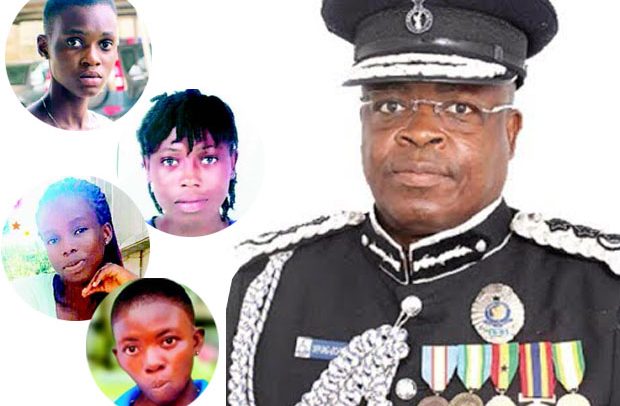Acting IGP, James Oppong-Boanuh. Insets: Priscilla Mantebea
Kuranchie, Priscilla Blessing Bentum, Ruth Love Quayson, Ruth Abakah.
One of the topmost pathologists in the country, Prof. Emmanuel Agyemang Badu Akosah, has raised red flags about the Ghana Police Service DNA report confirming the deaths of the four missing girls in Takoradi in the Western Region.
He said the DNA results as announced on Monday night by the acting Inspector General of Police (IGP), James Oppong-Boanuh, should not be taken hook, line and sinker.
“I believe sincerely that this forensic evidence should be subjected to a more experienced opinion,” he said on Accra-based Citi FM yesterday.
Families Agitation
The family members of three out of the four girls kidnapped in Takoradi have already rejected the police DNA report that confirmed the deaths of the missing girls, insisting that the girls, whom the Police Administration officially confirmed as dead after the much-talked-about DNA analysis, are alive.
Disjointed Stuff
Reacting to the report, Prof. Akosah, who is a former Director-General of the Ghana Health Service (GHS), said “I do not know the forensic scientist who performed this test but I believe that there are so many disjointed things in this discussion that I want a second opinion on this report. That is the only thing that will tie the ends of the case. Clearly, these girls were abducted on different dates and as far as I am concerned even if it was the same team doing the work, it tells us there is virtually no proper police investigation in this country.”
“I find it a little disconcerting especially that people could be abducted from different sites and at one point all the evidence point to the fact that they were in Nigeria and at another they were all brought to one place. As far as I am concerned, I will not rest. To begin to think that at the end of the day, we have all this evidence, including the most important evidence at the fore now, which is the DNA evidence from the body parts of these girls, I think more needs to be done,” the veteran pathologist added.
Police Position
A source at the Police Headquarters has told DAILY GUIDE that “the police cannot say they will not allow the families to get a second opinion if they so wish. All they need to do is to use the legal process to get access to the samples.”
No Detailed Report
The police also confirmed that the detailed DNA report had not been disclosed to the family. “What we have done is to inform the families through designated delegations all made up of senior police officers about what the tests say,” they added.
Cost Burden
The police, according to a source, will not bear the cost involving another DNA test if the families decide to go for a second opinion. The police engaged the services of a competent forensic expert who had his PHD in the United States for the DNA test, the source added.
More Questions
The teething question that is coming up following the release of the results is the actual date on which the girls might have died. It is unclear if the report captured all those instances as the police are not ready to go into details.
Earlier, the Director of Public Affairs of the Ghana Police Service, ACP David Eklu, confirmed on radio that the police do not have any objection to any attempt to seek a second opinion.
“The news on the girls isn’t a pleasant one. There are some concerns in the media which we may find difficult to understand. We deal with the families on individual basis. If the families want the remains for independent tests, we won’t object to that,” he said.
Independent Analysis
The families have said they will demand an independent DNA analysis to confirm whether the girls are dead or alive.
According to them, their rejection of the report was based on their conviction that the girls were still alive as indicated by the Director of the Criminal Investigations Department (CID) some months ago. They said they were disappointed at the manner the police communicated the DNA report on Monday evening when the story was already in the media.
Main Announcement
The IGP in announcing the DNA report had said the family had already been informed about the fact that the samples taken matched the human remains found.
Thus, the skulls and other human remains retrieved over a month ago by the forensic team of the Ghana Police Service at the hideout of the prime suspect in the case, Samuel Udoetuk Wills, were that of the missing girls, the IGP confirmed.
As a result, the police concluded that Priscilla Blessing Bentum, 21; Priscilla Mantebea Kuranchie, 18; Ruth Love Quayson, 18; and Ruth Abakah, 19, are deceased.
The IGP’s announcement was immediately met with rejection by the families of Quayson, Bentum and Abakah.
From Emmanuel Opoku, Takoradi


